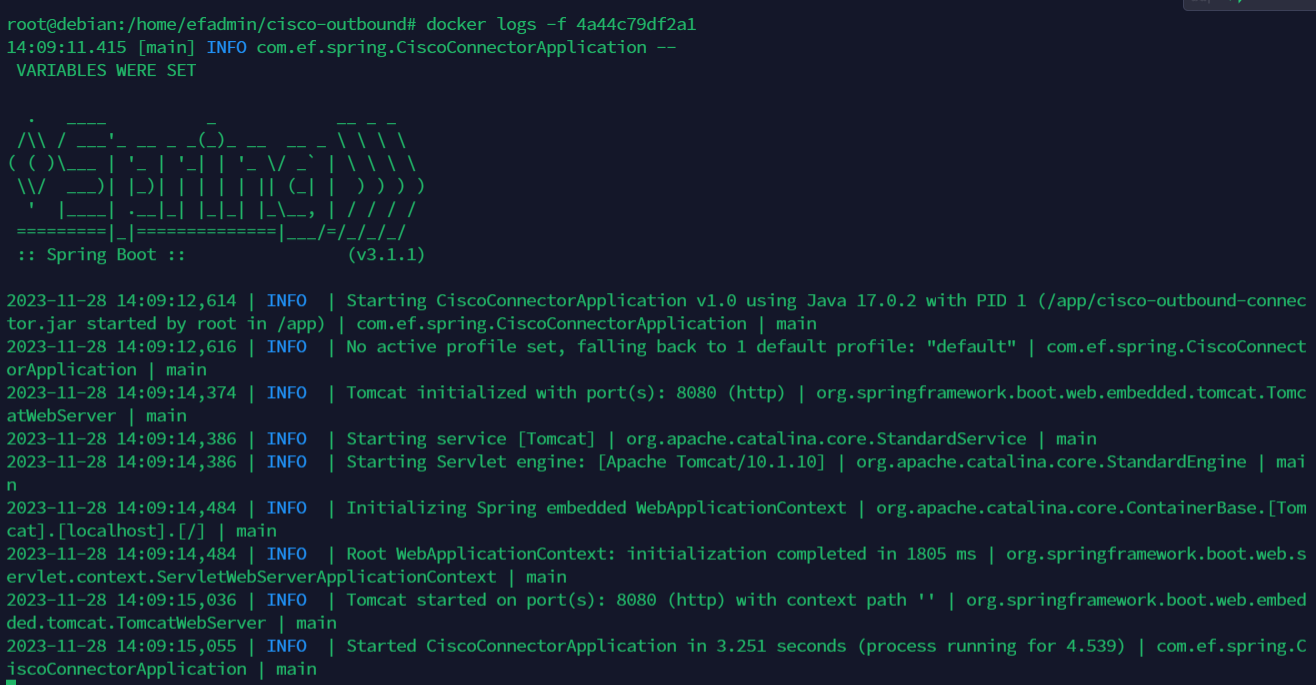Prerequisites
Software Requirements
|
Item |
Recommended |
Installation guide |
|
Operating System |
Debian 12 |
- |
|
Docker |
v24 or higher |
|
|
EF CX |
Latest version |
|
|
Cisco UCCX/UCCE |
Latest version |
Port Utilization Requirements
The following ports must be open on the server for the cisco connector to function.
|
Type |
Application |
Description |
Port |
|
TCP |
Cisco Connector |
Access port |
any/ (set in docker-compose.yml) |
The ports can be opened as follows:
-
SSH into the Debian server.
-
Use command
ssh username@server-ip -
Enter the ssh password and press Enter.
-
Use command
su -
Enter the root user's password
-
-
Run the following command and replace PORT with each of the required ports listed above:
-
sudo iptables -A INPUT -p tcp -m tcp --dport PORT-j ACCEPT-
Example:
sudo iptables -A INPUT -p tcp -m tcp --dport 8021 -j ACCEPT
-
-
-
Save this port configuration with command:
sudo iptables-save.
Container Deployment
The Cisco connector is deployed as a docker image.


-
Create a folder cisco-connector with the command
mkdir cisco-connector -
Enter the folder with the command
cd cisco-connector -
Create a file docker-compose.yml.
-
vi docker-compose.yml
-
-
Enter editing mode with the 'I' or 'Insert' keys.
-
Copy the contents below and paste them into the file docker-compose.yml :
version: "3" services: cisco-connector: image: gitimages.expertflow.com/rtc/cisco-outbound-connector:TAG container_name: cisco-connector ports: - PORT:8080 env_file: - docker-variables.env restart: always-
Replace the 'TAG' keyword with the required image tag(Currently 1.0).
-
Replace ‘PORT’ with a port of your choice.
-
-
Save and exit by :
-
Press the Esc key.
-
Enter the phrase :wq to save and exit.
-
-
Create a file docker-variables.env
-
vi docker-variables.env
-
-
Enter editing mode with the 'I' or 'Insert' keys.
-
Copy the contents below and paste them into the file env.txt :
TRUST_STORE_PATH=truststore.jks TRUST_STORE_PASSWORD=alpine CISCO_TYPE=CCX CISCO_FQDN=https://uccx.com:8445 CISCO_USERNAME=administrator CISCO_PASS=password-
The TRUST_STORE_PATH and TRUST_STORE_PASSWORD should not be changed.
-
CISCO_TYPE= Set CCX or CCE depending on what type of Cisco UCC you are using.
-
CISCO_FQDN= The address of the Cisco deployment.
-
CISCO_USERNAME= The admin username of the Cisco deployment.
-
CISCO_PASS= The admin password of the Cisco deployment.
-
-
Within the folder run the command
docker compose up -d -
Confirm that the docker container is running by using the command
docker ps -
-
Confirm that the container is running correctly by opening the logs with command
docker logs -f containerID -

